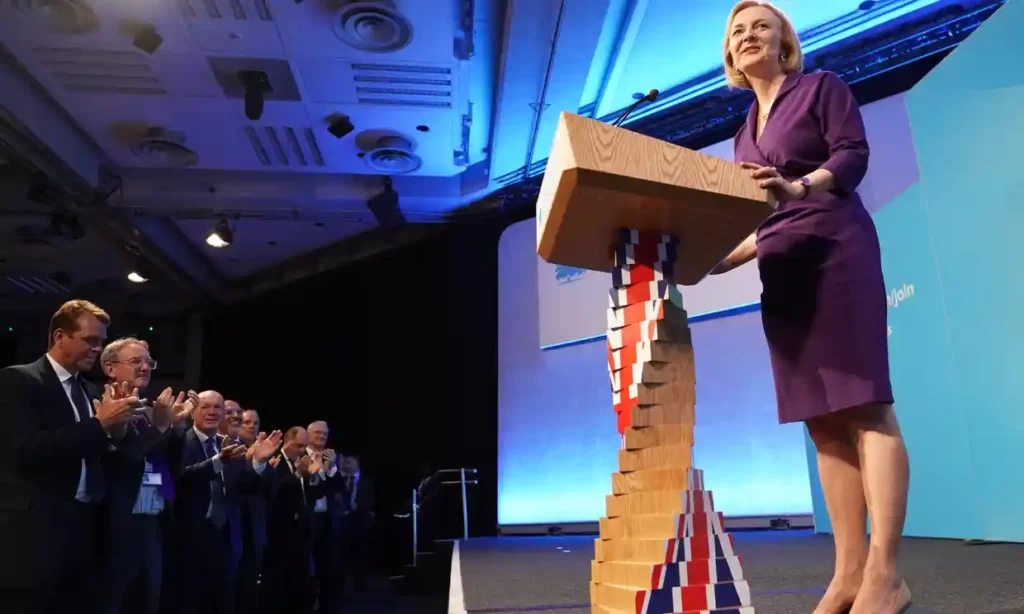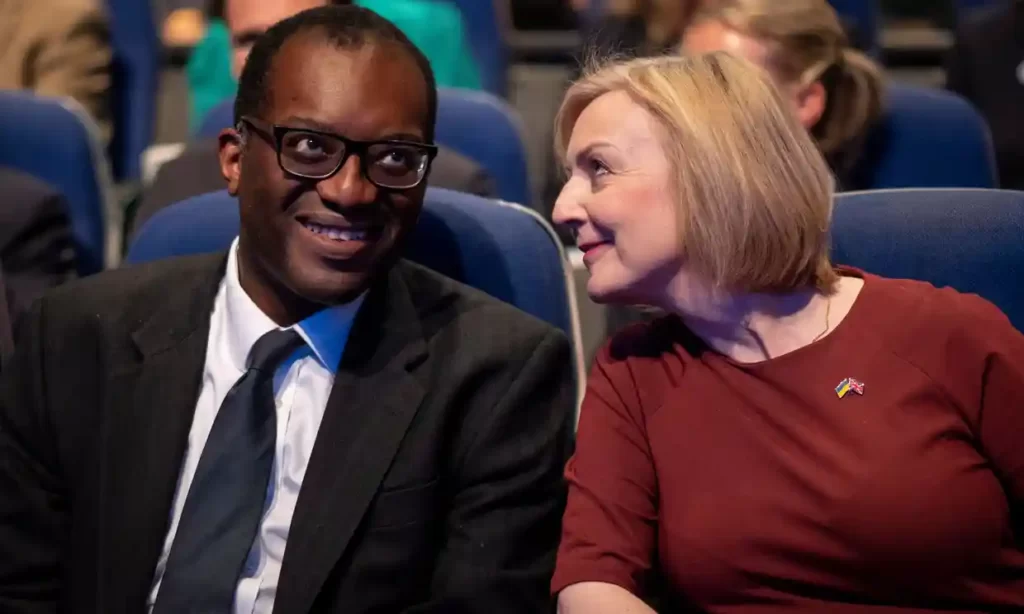After the shortest-ever term as Britain’s prime minister, how did a politician who spent 12 years in government, including in many key roles, make such a historic mess of the top job?
It may not have been the most troubling feature of Liz Truss’s premiership but the need to check whether she was still in office was a gathering distraction for anyone, including her cabinet colleagues, interested in who was running the country. A month ago, after the disastrous mini-budget, no one was sure if she could survive until the next election. Thereafter, the timeframe rapidly narrowed until the question was whether she would last the day.
There was a brief holiday from reality during the party conference in Birmingham, when the ship had already hit the iceberg, and yet, in a surreal atmosphere of denialism, the band played on. But on Thursday, six days after she had been forced to sack her ideological soulmate Kwasi Kwarteng as chancellor, and the day after home secretary Suella Braverman resigned, we got the answer.
But how did a politician with 12 years experience in government, almost 10 of them in the cabinet, someone who’d served as foreign secretary, international trade secretary, justice secretary, environment secretary, and chief secretary to the Treasury, come to make such a historic mess of the top job?
When asked to describe Truss, two former Conservative government ministers both used the same word: weird. “She doesn’t have any friends. She’s just weird,” one said. “She sits far too close to you,” said another. “And when she talks to you, she keeps repeating your name. It’s weird.”
The most common definition of weird is to do with being unnatural, strange, or awkward, all pejoratives that have been aimed in Truss’s direction. There is, though, another meaning that stems from the word’s Middle English usage, which is about having “the power to control destiny”. Although the politicians used the word in the former sense, perhaps it is in the archaic meaning that Truss would have most recognized herself.
For there was nothing inevitable about her progress. The eldest of Cambridge graduates John and Priscilla Truss’s four children, Truss likes to tell the story of when, as a young girl, she was given a “junior air hostess” badge on a plane journey, while her brother was awarded a “junior pilot” badge. She says this patriarchal attitude made her more determined to succeed.
Arguably, a more revealing anecdote comes from her brother, who has said that Truss “had to win” at Monopoly, and if defeat looked imminent, she would “disappear rather than lose”.

If from a young age she had a sense of herself as someone who was going places, it may have had something to do with her peripatetic family. By the time she was 13, she had moved from Oxford to Paisley in Scotland, and lived in British Columbia in Canada, and in Leeds. This was due to her academic father, who is an emeritus professor of pure mathematics at the University of Leeds, and apparently not a fan of his daughter’s politics.
Her mother, who has a doctorate in social history, was a nurse and teacher, and a member of the Campaign for Nuclear Disarmament with whom Truss attended Ban the Bomb protests as a child. Truss has described her parents, who divorced in 2003, as “left of Labour”.
At her recent party conference, she spoke of herself as “the first prime minister of our country to have gone to a comprehensive school”. The claim has been disproved by those who note that both Gordon Brown and Theresa May went to comprehensive schools. In any case, Truss has said that Roundhay School in Leeds “let down” children by teaching them “about racism and sexism” with “too little time spent making sure everybody could read and write”.
Again, the notion that Roundhay, a consistently “outstanding” school, was unacademic has been strenuously contested, as has Truss’s claim that her comfortable middle-class neighborhood in Leeds was “at the heart of the red wall”. Truss is not the first politician to massage her biography but she’s unusual in attempting to establish her rightwing credentials by making her formative years seem more underprivileged than they were.
As with so many British prime ministers, the Truss story began in earnest at Oxford, where she read philosophy, politics, and economics at Merton. She became president of the university Liberal Democrats and a member of the national executive committee of the party’s youth and student wing. Also at Oxford and another Lib Dem activist was Mark Littlewood, now director general of the free market think tank most associated with Truss’s political outlook, the Institute for Economic Affairs (IEA). He remembers her as a “dynamo who exploded onto the political scene”. At the time, the mark of a student’s renown was how often they were mentioned in the John Evelyn gossip column of Cherwell, the university newspaper. Truss was a regular fixture.

She was forthright and outspoken, quite unlike other students who were looking to climb the ranks of political societies – the kind of people, says Littlewood, who would think twice, before saying nothing.
“If you spent any more than three minutes in her company, you had no doubt at all about what she thought of the particular topic you might be discussing,” Littlewood says.
For others, like Neil Fawcett, a fellow committee member of the Lib Dems’ student national executive, this trait of certitude came across as dogmatic and unbending. “She always had very strong views on everything,” he recalls. “Sometimes they were based on knowledge or experience but quite often they weren’t. “My main memory is that if she came up with something that simply wasn’t going to work, and I was in a position where I had the experience to know that it wasn’t going to work, she would still argue the case anyway.
If she came up with something that simply wasn’t going to work she would still argue the case anyway
Neil Fawcett, fellow committee member of Lib Dems student executive
“She was absolutely not for turning, whatever the evidence. I thought of that when I read about Treasury civil servants who have been completely ignored because she knew better.”
She was more concerned to make a splash, he says, than to get things done. Littlewood suggests, in her defense, that Truss was not much interested in “delivering leaflets”. Instead, she spoke out against the monarchy at a Lib Dem conference and protested against the BNP in Tower Hamlets.
While campaigning to become party leader, Truss made light of her youthful infatuation with the Lib Dems. “We all make mistakes,” she told hustings in Eastbourne. “Some people have sex, drugs, and rock’n’roll, I was in the Liberal Democrats. I’m sorry.”
But Littlewood insists that the Lib Dems made more sense at the time to Truss because the Conservatives were authoritarian on civil liberties and Truss was primarily interested in personal freedom. This, he says, has been the constant in her political career.
“People say she was a Liberal Democrat and now she’s a Tory. She was a remainder and became a Brexiter. She was a republican and she’s a monarchist. But actually, her overarching view of the world has always been a classical liberal one, that the state is too big and interfering in our lives,” he says.
She joined the Conservatives in 1996 – when the “back to basics” morality campaign was still alive, if not very well – and 13 years later, it was her local Tory party that wanted to interfere in her life.
After working as an accountant for Shell, getting married to fellow accountant Hugh O’Leary, becoming an economic director for Cable and Wireless, and then deputy director of the Reform think tank, she was selected to be the Conservative candidate for the safe seat of southwest Norfolk.
Several constituency association members, dubbed the “Turnip Taliban”, objected, arguing that Truss had not disclosed the extramarital affair she had had with the Conservative MP Mark Field. A motion to cancel her candidature was defeated after the then-leader David Cameron came to Truss’s aid.
The knowledge of the affair with Field has hung around Truss in a way that it probably would not have done with a male politician. There is a welter of parliamentary gossip and tall stories concerning Truss that MPs routinely refer to, the off-the-record, although no one can ever name a source or witness. “She flirted with every man she comes across,” says one (female) former Tory minister. “She almost even flirted with women.” At the same time, so many of her colleagues and former colleagues – including the one who speaks of her flirting – report that she was unapproachable and, as another put it, “she doesn’t have great interpersonal skills”.
What most MPs agree that she has always had is ambition. Four years after entering parliament in 2010, she joined the cabinet as environment secretary. The most attention she received in the post came with a bizarrely emphatic speech she gave to the Tory party conference.
Who is Liz Truss?
Liz Truss, a British politician, is well-known for her successful political career. She is the 15th British Prime Minister crowned by Queen Elizabeth II on September 6th, 2022, who has seen an era of change. She is officially Britain’s fourth prime minister in six years and the third woman to take on the role. After being named as Britain’s new prime minister, Truss said that she will cut taxes and focus on growing the UK’s economy.
Liz Truss is a British politician. She currently serves as the Prime Minister of the United Kingdom and Leader of the Conservative Party. After Johnson’s resignation amid a government crisis, she won the 2022 Conservative Party leadership election, became the UK’s third female prime minister, and formed the Truss ministry.
Truss began her political career as a councilor for the London Borough of Greenwich prior to running as Conservative MP for Hemsworth in 2011. She served as Parliamentary Under-Secretary of State for Childcare and Education from 2012 to 2014, before being appointed to the Cabinet by Cameron as Secretary of State for the Environment, Food, and Rural Affairs in the 2014 cabinet reshuffle.
After Cameron’s resignation in July 2016, Truss was appointed Secretary of State for Justice and Lord Chancellor by May, becoming the first female Lord Chancellor in the thousand-year history of the office. Following the 2017 United Kingdom general election, Truss was appointed Chief Secretary to the Treasury.
Source: factmandu
